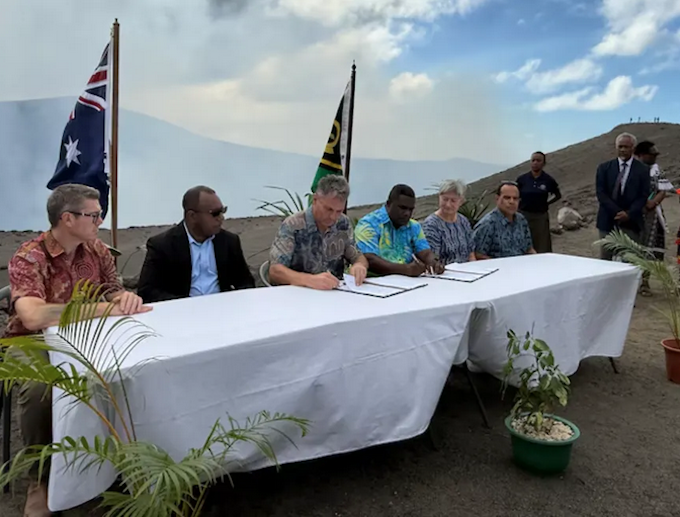
By Koroi Hawkins, RNZ Pacific editor
A Pacific analyst and commentator says it is unlikely that Vanuatu will agree to any exclusive rights in the new security and economic pact with Australia.
Senior ministers of both countries, including deputy prime ministers Richard Marles and Johnny Koanapo, initialled the Nakamal Agreement at the summit of Mount Yasur volcano on Tanna Island, ahead of formal sign-off next month.
The two nations have agreed to a landmark deal worth A$500 million that will replace the previous security pact that was scrapped in 2022.
Dr Tess Newton Cain of the Griffith Asia Institute said she did not believe Vanuatu would agree to anything similar to what Tuvalu (Falepili Union) and Papua New Guinea (Bilateral Security Agreement) had agreed to in recent times.
She said that the Australian government had been wanting the deal for some time, but had been “progressing quite slowly” because there was “significant pushback” on the Vanuatu side.
“Back in 2022, it took people by surprise that there was an announcement made that a security agreement had been signed while Senator Penny Wong, Australia’s Foreign Minister was in Port Vila. She and then-prime minister Ishmael Kalsakau had signed a security agreement.
“On the Australian side, they referred to it as having not been ratified. But essentially it was totally disregarded and thrown out by Vanuatu officials, and not considered to [be a] meaningful agreement.”

High-level engagement
However, this time around, Dr Newton Cain said, there had been a significant process of negotiation between Vanuatu and Australian officials.
“There has been a lot of high-level engagement. We have had a lot of senior Australian officials visiting Vanuatu over the last six months, and possibly for a bit longer. So, it has been a steady process of negotiation.”
Dr Newton Cain said the text of the agreement had undergone a much more rigorous process, involving input from a wider range of people at the government level.
“And in the last few days leading up to the initialling of this agreement, it was brought before the National Security Council in Vanuatu, which discussed it and signed off on it.
“Then it went to the Council of Ministers, which also discussed it and made reference to further amendments. So there were some last-minute changes to the text, and then it was initialled.”
She said that while the agreement had been “substantially agreed”, more details on what it actually entailed remained scarce.
Vanuatu Prime Minister Jotham Napat said earlier this month that he would not sign the agreement unless visa-free travel was agreed.
Visa sticking point
Dr Newton Cain said visa-free travel between the two countries remained a sticking point.
“Prime Minister Napat said he hoped Prime Minister Albanese would travel to Port Vila in order to sign this agreement. But we know there is still more work to do — both Australia and Vanuatu [have] indicated that there were still aspects that were not completely aligned yet.
“I think it is reasonable to think that this is around text relating to visa-free access to Australia. There is a circle there that is yet to be squared.”
Australia is Vanuatu’s biggest development partner, as well as the biggest provider of foreign direct investment. Its support covers a range of critical sectors such as health, education, security, and infrastructure.
According to Dr Newton Cain, from Canberra’s point of view, they have concerns that countries like Vanuatu have “more visible, diversified and stronger” relations with China.
“As we have seen in other parts of the region, that has provoked a response from countries like Australia, New Zealand, the United States and others that want to be seen to be offering Vanuatu different options.”
However, she said it was not surprising that Vanuatu was looking to have a range of conversations with partners that can support the country.
“China’s relationship has moved more into security areas. There are aspects of policing that China is involved in in Vanuatu, and that this is a bit of a tipping point for countries like Australia and New Zealand.
“So these sorts of agreements with Australia [are] part of trying to cement the relationship [and] demonstrate that this relationship is built on lasting foundations and strong ties.”
This article is republished under a community partnership agreement with RNZ.











































